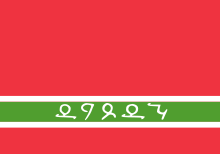
Lezgistan is an ethnic homeland of the Lezgins, as well as the area of distribution of the Lezgin language.[1]
Historical toponym
[edit]While ancient Greek historians, including Herodotus, Strabo, and Pliny the Elder, referred to Legoi people who inhabited Caucasian Albania, Arab historians of 9-10th centuries mention the kingdom of Lakz in present-day southern Dagestan.[2] Al Masoudi referred to inhabitants of this area as Lakzams (Lezgins),[3] who defended Shirvan against invaders from the north.[4]
Prior to the Russian Revolution, "Lezgin" was a term applied to all ethnic groups inhabiting the present-day Russian Republic of Dagestan.[5]
The first notion of an autonomous Lezgin territory, that is, "Lezgistan", was voiced in 1936 during Joseph Stalin's reign.[6]
Independence projects
[edit]
After the dissolution of USSR there was an irredentist project to create a unified Lezgistan on Lezgin-inhabited areas of Azerbaijan and Russian Republic of Dagestan.[7] In December 1991, various Lezgin groups held the All-National Congress of Lezgins. During it, they adopted a declaration calling for the creation of an independent Lezgistan, which would be a national entity uniting the Lezgins of Dagestan and Azerbaijan.[8] Sadval movement[9][10] and Federal Lezgian National and Cultural Autonomy, Samur[11] are the main political organisations seeking separatism.
See also
[edit]References
[edit]- ^ Haspelmath 1993, p. 18.
- ^ Haspelmath 1993, p. 17.
- ^ Yakut, IV, 364. According to al-Masoudi (Murudzh, II, 5)
- ^ VFMinorsky. History of Shirvan. M. 1963
- ^ Olson, James Stuart; Pappas, Nicholas Charles (1994). An Ethnohistorical dictionary of the Russian and Soviet empires. Greenwood Publishing Group. p. 438. ISBN 0313274975.
- ^ Sayfutdinova, Leyla (2022). "Ethnic Boundaries and Territorial Borders: On the Place of Lezgin Irredentism in the Construction of National Identity in Azerbaijan". Nationalities Papers. 50 (4): 799. doi:10.1017/nps.2021.3. hdl:10023/23933. S2CID 236600082.
- ^ Markedonov, Sergey (2010). Radical Islam in the North Caucasus. Center for Strategic and International Studies. p. 2. ISBN 978-0892066148.
- ^ Minorities at Risk Project, Chronology for Lezgins in Russia, 2004 (accessed 21 September 2011)
- ^ Demirdjian, Z. S. Andrew (25 May 2021). "Lezgistan: Lurking threat to Azerbaijan". Keghart. Retrieved 11 October 2022.
- ^ "Lezgin Leader Assassinated in Dagestan". Jamestown. Retrieved 2023-06-14.
- ^ "Lezgins in Azerbaijan". Minority Rights Group. Retrieved 2024-04-07.
Sources
[edit]| Afghanistan | |
|---|---|
| Azerbaijan | |
| China | |
| Cyprus | |
| Georgia | |
| India | |
| Indonesia | |
| Iran | |
| Iraq | |
| Japan | |
| Kazakhstan | |
| Malaysia | |
| Myanmar | |
| Pakistan | |
| Philippines | |
| Russia | |
| Saudi Arabia | |
| Sri Lanka | |
| Syria | |
| Thailand | |
| Turkey | |
| Uzbekistan | |
| Vietnam |
|
| Yemen | |
| Albania | |
|---|---|
| Azerbaijan | |
| Belgium | |
| Bosnia and Herzegovina | |
| Croatia | |
| Cyprus | |
| Denmark | |
| Finland | |
| France | |
| Georgia | |
| Germany | |
| Greece | |
| Italy | |
| Kazakhstan | |
| North Macedonia | |
| Moldova | |
| Netherlands | |
| Norway | |
| Poland | |
| Romania | |
| Russia | |
| Serbia | |
| Spain | |
| Sweden | |
| Turkey | |
| Ukraine | |
| United Kingdom | |
| See also | |